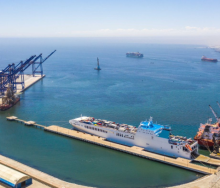America’s new fee regime targeting container line vessels built and operated by China could cause “complete destabilisation” of global container shipping alliances, a UK freight forwarder has warned.
According to Nick Evans, business development manager at AFS Global, the protectionist measure mooted by federal agency US Trade Representative (USTR), lines with any links to China “will become unattractive” to freight forwarders.
He said USTR fees were expected to prioritise alternative carriers to avoid the heavy penalties now levied on their customers’ cargo.
Evans told British supply chain publication The Loadstar that he predicted a surge in requests from producers to focus on operators not exposed to these fees, as the penalties risked cascading through supply chains and fundamentally altering the structure of longstanding vessel-sharing agreements.
Evans’ concerns are shared by peer stakeholders across the maritime sector.
Senior analyst Emily Stausbøll of Xeneta said that while a 180-day delay in fee implementation gave carriers time to adjust, it would likely trigger a major realignment of alliance services, with carriers swapping out affected Chinese-built ships for fee-exempt tonnage.
Shipping consultancy, Linerlytica, similarly expects carriers — particularly Chinese lines such as Cosco — to withdraw their own vessels from US trades and instead take slots on alliance partners’ ships that are not subject to the new fees.
Joe Kramek, president and CEO of the World Shipping Council (WSC), is highly critical of the USTR’s approach.
He said the regime would “raise prices for consumers, weaken US trade and do little to revitalise the US maritime industry,” calling the measures “backward-looking penalties” that disrupted long-term investment planning and introduced new costs and unpredictability for American businesses and consumers.
Kramek further warned that the fees imposed on global car carriers were “arbitrary” and would slow US economic growth while failing to encourage domestic maritime investment.
Prominent shipping analyst Lars Jensen, CEO of sea-intel consultancy Vespucci Maritime, has also pointed to the potential for significant alliance disruption.
He said the fees could force a rapid reshuffling of vessel deployments, with the potential for capacity shortages and increased blank sailings on major trade lanes as carriers scrambled to comply.
He warned that such instability could undermine the reliability of container shipping networks, with knock-on effects for global supply chains.
The revised USTR fees – set to take effect from October – will see Chinese-built ships calling at US ports charged up to $120 per container or $18 per net tonnage, with rates escalating in subsequent years.
While the policy aims to bolster US shipbuilding, critics say it risks pushing up freight rates, causing service disruptions, and diverting ships to Canadian and Mexican ports to avoid US penalties.
As the industry braces for the new regime, leading voices are urging Washington to reconsider. The WSC and others advocate for targeted investment incentives and infrastructure improvements, arguing that these would strengthen the US maritime sector without the trade disruption and cost inflation the new fees threaten to unleash.













